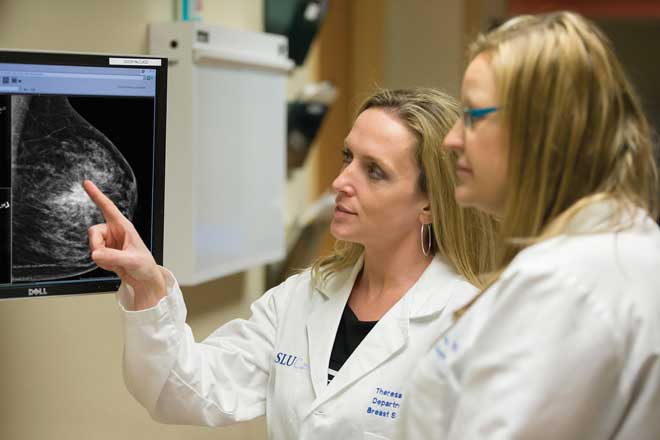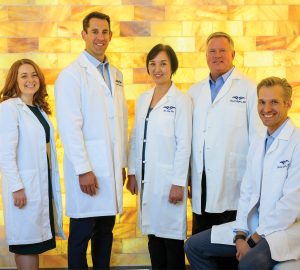About one in eight women in the U.S. will develop invasive breast cancer in their lifetime. More than 232,000 new cases were diagnosed last year, and about 40,000 women died. But the expert team at Saint Louis University Cancer Center, staffed with specialists from SLUCare Physician Group, helps women treat and beat the disease.
Some women are more comfortable being treated by female physicians at this vulnerable time in their lives, and SLUCare’s all-female breast cancer team is at their service. “This is a patient-centered culture,” notes radiologist Dr. Debbie Bennett, director of breast imaging at SLUCare and assistant professor of radiology at SLU School of Medicine. “Not all cancers are the same. We work together to design an individualized treatment plan around your unique needs.” Bennett specializes in breast screening and diagnostic evaluation, including mammography, ultrasound and MRI. “If I see something worrisome, I’ll perform a biopsy and recommend surgery, if need be,” she explains. “If it’s good news, that’s awesome! If not, we’ll support you and your family with kindness and compassion—and fight your cancer with everything we’ve got.”
SLUCare’s integrated breast cancer team coordinates patient care throughout treatment and follow-up, minimizing inconvenience and stress while helping women achieve the best possible outcome. “We provide everything you need in an easy-to-navigate setting,” says surgical oncologist Dr. Theresa Schwartz, assistant professor of surgery at SLU. The team includes radiologists, surgeons, radiation and medical oncologists, pathologists, geneticists, dietitians, social workers, cancer educators, and plastic surgeons who specialize in breast reconstruction. “We communicate with each other constantly,” Schwartz says. “Helping patients win their fight against breast cancer while collaborating with such a dedicated group is incredibly rewarding.”
Women with breast cancer now have more treatment options than ever before, she adds. “It used to be common practice to remove the entire breast and all the lymph nodes, which resulted in severe side effects and didn’t necessarily increase the chances of survival. Now we have the option to remove just the affected tissue and a few nodes, if that’s the patient’s choice. Women do just as well, with fewer side effects.” Today’s chemotherapy and radiation treatments, which target malignant cells and spare healthy tissue, are more effective and tolerable than ever, she adds.
And treatment for some cancers may become even less invasive in the future, Bennett notes. “Methods to destroy tumors by freezing or heating cancerous cells are now being studied,” she says. SLU’s standing as an academic medical center ensures that the latest research is rapidly translated into patient care, she adds. But SLUCare’s Cancer Center offers more than expertise and high-tech treatments. “You are not a ‘case’ to us, or a body part that needs to be radiated or removed,” she says. “You’re a woman. At SLUCare, we treat the whole person. Our goal is not only to keep you alive, but also to keep you healthy and thriving, so you can live the life you want to live.”
Pictured: Surgical oncologist Dr. Theresa Schwartz and plastic surgeon Dr. Christina Plikaitis
Photo courtesy of SLUCare Physician Group
[Saint Louis University’s breast cancer team is staffed by experts from SLUCare Physician Group. Drs. Bennett and Schwartz practice at SLU Hospital and SSM St. Mary’s Health Center. For more information, call 314.977.4440 or visit slucare.edu/breastcancer.]








